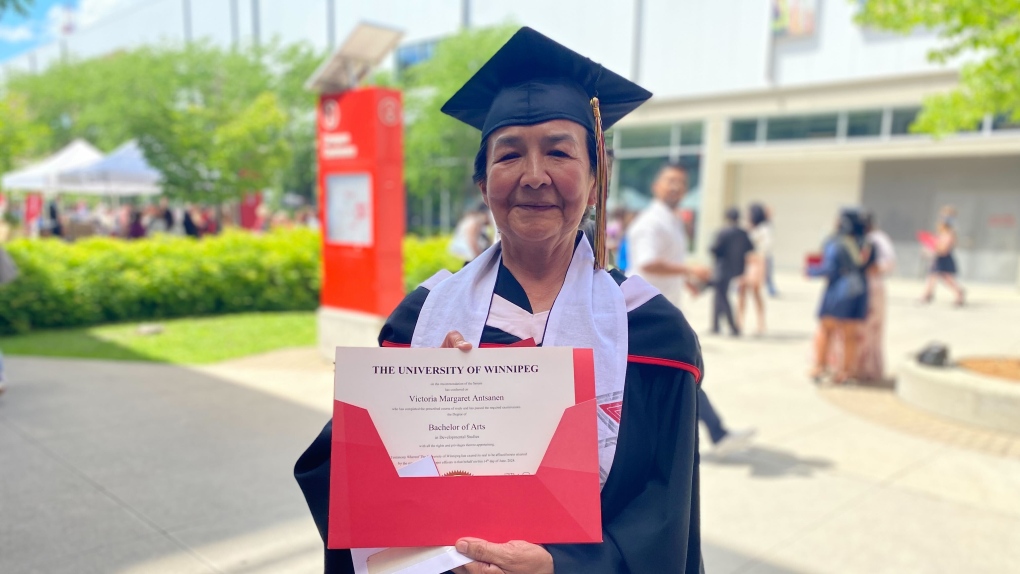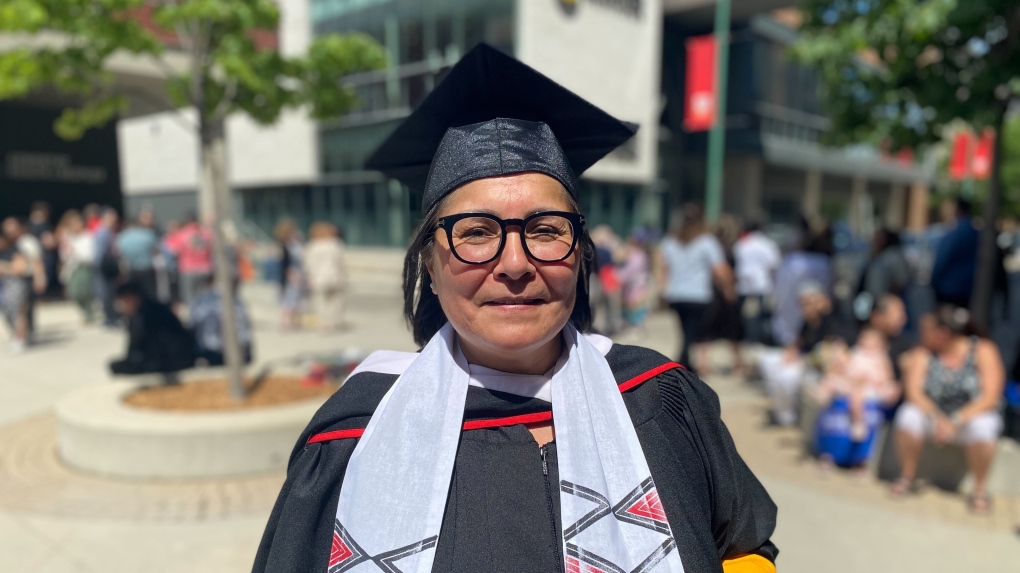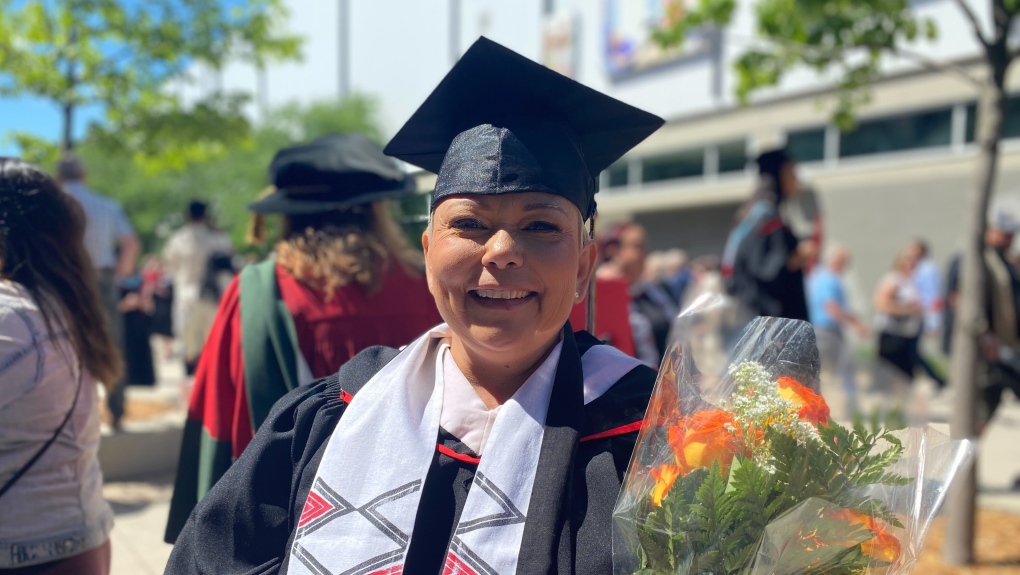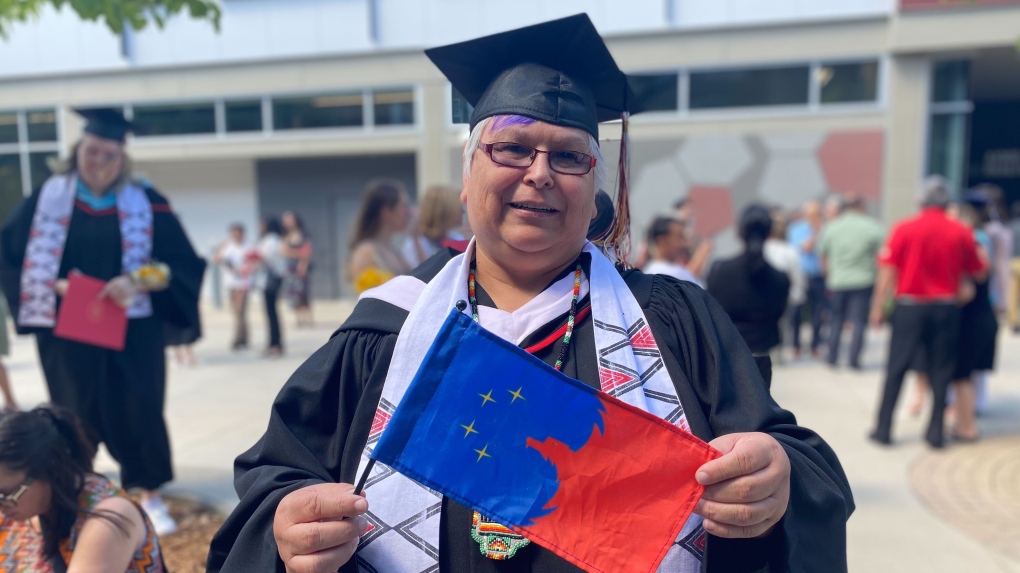'I'm just thankful': Indigenous group graduates from University of Winnipeg
A first in the University of Winnipeg’s faculty of education was celebrated at convocation Friday.
Nine Indigenous women in the Head Start program crossed the stage to receive their diplomas in developmental studies. According to the University of Winnipeg, it is the first time the number of Indigenous graduates in the program has outnumbered non-Indigenous grads.
“These women have been working so hard for many years, just before the pandemic, and we have been waiting for this day for a very long time,” said Sheri-Lynn Skwarchuk, director of the development studies program in the faculty of education.
Skwarchuk said the Aboriginal Head Start Program approached the University of Winnipeg to allow people who have been working in northern and rural communities an opportunity to upgrade their skills.
“Some of them hadn’t even graduated high school,” she said. “If you've been working in early childhood and you have your ECE two degree, we're going to work together, and we're going to get this done, and you're going to get your first university degree.”
CTV News Winnipeg spoke with four of the women in the program, who shared their stories of pride, struggle and relief of graduating.
 Victoria Antsenan poses for a photo after receiving her developmental studies degree from the University of Winnipeg on June 14, 2024. (Danton Unger/CTV News Winnipeg)
Victoria Antsenan poses for a photo after receiving her developmental studies degree from the University of Winnipeg on June 14, 2024. (Danton Unger/CTV News Winnipeg)
Victoria Antsenan, Lac Brochet.
“I guess after I settle down, then I'll realize that I'm actually finished my studies."
Victoria Antsenan of Lac Brochet, Man., said she had some struggles outside of her school life in the final year of the program.
“I got sick with lymphoma cancer,” she said. “I went to treatment for five months, so I just finished in December. The doctors said everything is OK, so I'm recovering, which is good to hear. So now every day I am just thankful.”
Antsenan said help from her family was key for her to graduate, noting her husband stayed with her in the city as she underwent treatment.
“Without their support, I wouldn't have done it,” she said.
In addition to the family, the other students in the cohort supported each other as they navigated a tricky space.
“We had to get back into writing mode,” Antsenan said. “Some were struggling with computers, especially with university, when you have to hand in your assignments and you have to go to the computer system.”
 Liz Keeper-Garson poses for a photo after receiving her developmental studies degree from the University of Winnipeg on June 14, 2024. (Danton Unger/CTV News Winnipeg)
Liz Keeper-Garson poses for a photo after receiving her developmental studies degree from the University of Winnipeg on June 14, 2024. (Danton Unger/CTV News Winnipeg)
Liz Keeper-Garson, Tataskweyak.
“I feel amazing. I never thought I would feel this way. Like to have a degree that I worked so hard for.”
Liz Keeper-Garson had worked in the Head Start program for 20 years when she decided to upgrade her education. She said she was proud of the work she put in to receive her degree.
“There was a lot of hard work, a lot of dedication, and I just kept thinking about my family,” she said. “You had to do a lot of this work, a lot of Zoom classes, and I had to learn how to do PowerPoint.”
Keeper-Garson said she will be doing an overhaul of programs in the community, and she wants her degree to be an inspiration to Indigenous youth.
“Don’t be scared when you hear about education,” she said. “It's always like we're afraid. But once you're in a program, it becomes like, ‘OK, I'm here,’ and it's not as hard as you may think it is.”
 Twyla McKay poses for a photo after receiving her developmental studies degree from the University of Winnipeg on June 14, 2024. (Danton Unger/CTV News Winnipeg)
Twyla McKay poses for a photo after receiving her developmental studies degree from the University of Winnipeg on June 14, 2024. (Danton Unger/CTV News Winnipeg)
Twyla McKay, Crane River.
"I'm so blessed."
Twyla McKay of Crane River noted the class started during the height of the pandemic.
“We did a lot of our studies on Zoom, sometimes with really crappy Internet service,” she said. “But we did it, we ventured through and we got it done.”
Like Keeper-Garson, McKay said she wants to show people they shouldn’t be scared to further their education.
“I'm not going to lie, I was intimidated, because we were out of school for so long, and it was a lot, like our first class ever was through Zoom,” she said. “We were on our own.”
She added she enjoyed the experience, and believes everyone is capable of doing it.
 Vivian Scott poses for a photo after receiving her developmental studies degree from the University of Winnipeg on June 14, 2024. (Danton Unger/CTV News Winnipeg)
Vivian Scott poses for a photo after receiving her developmental studies degree from the University of Winnipeg on June 14, 2024. (Danton Unger/CTV News Winnipeg)
Vivian Scott, Pimicikamak.
"We wanted more for ourselves."
Vivian Scott, who serves as a council member in Pimicikamak, said she was interested in the program as a way to help increase education for early childhood educators in the community.
“Even though we provide the foundation in our communities for the little ones, we wanted more for ourselves,” she said. “So we wanted to continue. So, when the opportunity came that we wanted, we wanted more.”
Scott said she is hoping Indigenous people, no matter their age, will be inspired.
“Some of us are in our 50s, and if we can go back to school, you can go back to school.”
A new cohort will be starting the program in the fall.
CTVNews.ca Top Stories

BREAKING Donald Trump picks former U.S. congressman Pete Hoekstra as ambassador to Canada
U.S. president-elect Donald Trump has nominated former diplomat and U.S. congressman Pete Hoekstra to be the American ambassador to Canada.
Genetic evidence backs up COVID-19 origin theory that pandemic started in seafood market
A group of researchers say they have more evidence to suggest the COVID-19 pandemic started in a Chinese seafood market where it spread from infected animals to humans. The evidence is laid out in a recent study published in Cell, a scientific journal, nearly five years after the first known COVID-19 outbreak.
This is how much money you need to make to buy a house in Canada's largest cities
The average salary needed to buy a home keeps inching down in cities across Canada, according to the latest data.
'My two daughters were sleeping': London Ont. family in shock after their home riddled with gunfire
A London father and son they’re shocked and confused after their home was riddled with bullets while young children were sleeping inside.
Smuggler arrested with 300 tarantulas strapped to his body
Police in Peru have arrested a man caught trying to leave the country with 320 tarantulas, 110 centipedes and nine bullet ants strapped to his body.
Boissonnault out of cabinet to 'focus on clearing the allegations,' Trudeau announces
Prime Minister Justin Trudeau has announced embattled minister Randy Boissonnault is out of cabinet.
Baby dies after being reported missing in midtown Toronto: police
A four-month-old baby is dead after what Toronto police are calling a “suspicious incident” at a Toronto Community Housing building in the city’s midtown area on Wednesday afternoon.
Sask. woman who refused to provide breath sample did not break the law, court finds
A Saskatchewan woman who refused to provide a breath sample after being stopped by police in Regina did not break the law – as the officer's request was deemed not lawful given the circumstances.
Parole board reverses decision and will allow families of Paul Bernardo's victims to attend upcoming parole hearing in person
The families of the victims of Paul Bernardo will be allowed to attend the serial killer’s upcoming parole hearing in person, the Parole Board of Canada (PBC) says.


































